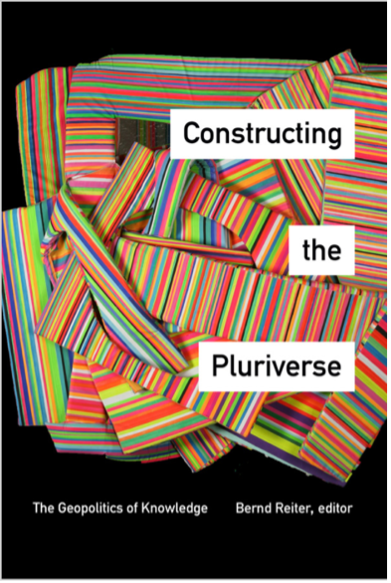This text is licensed under the Creative Commons license Attribution-NonCommercial-ShareAlike 4.0 International. The link to the original material is situated at the top right of the text.

Source: https://dup.silverchair-cdn.com/dup/content_public/books/2479/book/3/m_9781478002017_cover.jpeg
Book
Bernd Reiter (editor)
Keywords: pluriverse, decoloniality, non-western epistemology, anti-development, ontological politics
Threads: (Un)framing Knowledge
Constructing the Pluriverse: Geopolitics of Knowledge
Bernd Reiter (editor)
Zaid Ahmad, Manuela Boatcă, Hans-Jürgen Burchardt, Raewyn Connell, Arturo Escobar, Sandra Harding, Ehsan Kashfi, Venu Mehta, Walter D. Mignolo, Ulrich Oslender, Issiaka Ouattara, Bernd Reiter, Manu Samnotra, Catherine E. Walsh, Aram Ziai
2018
Keywords: pluriverse, decoloniality, non-western epistemology, anti-development, ontological politics
Threads: (Un)framing Knowledge
Short description
The contributors to Constructing the Pluriverse critique the hegemony of the postcolonial Western tradition and its claims to universality by offering a set of “pluriversal” approaches to understanding the coexisting epistemologies and practices of the different worlds and problems we inhabit and encounter. Moving beyond critiques of colonialism, the contributors rethink the relationship between knowledge and power, offering new perspectives on development, democracy, and ideology while providing diverse methodologies for non-Western thought and practice that range from feminist approaches to scientific research to ways of knowing expressed through West African oral traditions. In combination, these wide-ranging approaches and understandings form a new analytical toolbox for those seeking creative solutions for dismantling Westernization throughout the world.
Personal appreciation
The idea of pluriverse as a ‘world in which many worlds exist’ has been such an inspiration to us since we first encountered it in discussions in Colombia. We feel it as an idea that ruptures global-neoliberal-developmental-neocolonial logic and brings forward numerous ways of being, feeling, knowing and inhabiting the Earth that have been marginalized by Western hegemony. And this particular edited volume illustrates the richness of knowledge traditions across the globe.
Contribution to the "Who knows?" handbook
Constructing the Pluriverse: Geopolitics of Knowledge is interesting for Shakin’ because it features diverse ontological and epistemic frameworks as legitimate knowledge systems alternative to Western scientific discourse. Some of them are: aquatic ontologies in the rainforests in Colombia; feminist approaches to scientific research; knowing and learning through West African oral traditions; Jainism and its ways of constructing knowledge; buenvivir as a concept for good life based on indigenous knowledge systems; etc. It offers rich and vibrant alternatives to dominant ways of generating and legitimising knowledge in both science and formal education.
Material(s)
Link to material #1 - Shapiro, M. (2021). Reiter, Bernd (ed.). Constructing the pluriverse: the geopolitics of knowledge. xvi, 330 pp., table, figs, bibliogrs. Durham, N.C.: Duke Univ. Press, 2018. £20.99 (paper). Journal of the Royal Anthropological Institute, 27(3), 707–708
Link to material #2 - Parker, J. (2020) Epistemology and Decolonial Politics, Socoety and Space
Link to material #2 - Parker, J. (2020) Epistemology and Decolonial Politics, Socoety and Space
Additional Information
| Location | International academic collaboration |
| Original language(s) | English |
| Existing translations | |
| Length | 330 pages |
| Project runtime | - |
| Institution of affiliation | Duke University Press |
| Sponsor(s) |
Name of contributor: Višnja Kisić and Goran Tomka
Additional Pictures
Creative Commons
Related Contributions

Project
ALICE Epistemologies of the South Research Programme
Boaventura de Sousa Santos, Bruno Sena Martins, Cristiano Gianolla, João Arriscado Nunes, José Manuel Mendes, Maria Paula Meneses, Sara Araújo, Teresa Cunha (Team of Core Researchers, all based at CES (Center of Social Studies), University of Coimbra)
2017

Project
Anthropocene Curriculum
Haus der Kulturen der Welt, List of Contributors
2013
What should a body of “earthbound” knowledge contain that traverses from the global to the local and back?







